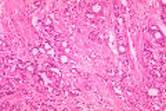
THURSDAY, Feb. 21 (HealthDay News) — Men with advanced prostate cancer might live longer when they are taking blood-thinning medication, a small study suggests.
Prostate cancer patients who were also taking a blood thinner, usually to stave off a blood clot, had a 39 percent increase in overall survival over men who were not taking these drugs, report researchers from the Johns Hopkins Sidney Kimmel Comprehensive Cancer Center in Baltimore.
But the study authors and outside experts caution that blood thinners can’t be prescribed routinely to cancer patients, as they confer risks including bleeding, although men who need an anticoagulant might also find it beneficial in terms of prostate cancer. The findings were presented this month by Caroline Pratz and colleagues at an American Society of Clinical Oncology (ASCO) conference in Orlando, Fla.
The U.S. National Cancer Institute estimates that this year almost 239,000 new cases of prostate cancer will be diagnosed in the United States, and nearly 30,000 men will die from the disease.
The new study included almost 250 men with advanced or spreading prostate cancer who were receiving chemotherapy. Of these, 11.7 percent were also taking a blood thinner to prevent potentially fatal blood clots that could detach and reach their lungs, known as a pulmonary embolism. The men taking blood thinners — heparin and warfarin were included — survived for about 21 months, compared to slightly more than 17 months for men who were not taking blood thinners.
The finding was surprising, because the researchers thought venous thromboembolism — clots deep in the leg veins — would negatively affect overall survival.
But how or even if the blood-thinning medications could confer a survival edge is unknown. The study only shows an association, it does not show that it’s the blood thinners themselves that made the difference, said Dr. Cy Stein, an oncologist at the City of Hope Medical Center in Duarte, Calif., who was not involved with the study.
“Maybe men who develop blood clots have something else that affects how they respond to chemotherapy. We just don’t know,” Stein said.
Another expert said this is not the first time that blood thinners, including aspirin (which was not included in the new study), have been linked to improved survival for men with prostate cancer.
“Most of the data comes out of studies where oncology patients are being treated with blood thinners to prevent blood clots and incidentally there was some improvement in survival,” said Dr. Manish Vira, director of the fellowship program in urologic oncology at North Shore-LIJ’s Arthur Smith Institute for Urology in Lake Success, N.Y.
The new findings are “thought-provoking, but we should not just go ahead and treat everyone with cancer with blood thinners based on this study,” he said.
Further research is needed, agreed Dr. Eric Singer, a urologic oncologist at the Cancer Institute of New Jersey and assistant professor of surgery at UMDNJ-Robert Wood Johnson Medical School in New Brunswick, N.J. “There is evidence from a number of studies suggesting that blood thinners might interact in some different ways with cancer and its treatment,” Singer said.
“The guys who were getting [blood thinners] did better and something could be going on there, but keep in mind that being on a blood thinner comes with a risk of bleeding and stroke and should not be used lightly,” Singer added.
More work is needed to confirm the results, and then to determine the ideal anticoagulant as well as the dose, timing and related risks, the study authors said.
More information
The U.S. National Cancer Institute has more on prostate cancer.

